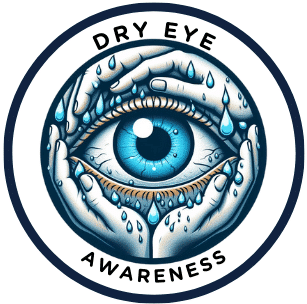
If you’re coping with the persistent discomfort of Dry Eye Syndrome (DES), you’re certainly not alone. DES doesn’t just affect your eyes; it can disrupt your daily life. My aim is to shed light on this common condition, moving beyond just a medical definition to explore the significance of a holistic approach to management.
DES occurs when your eyes lack the moisture they require, leading to symptoms that may include itchiness, redness, and a gritty sensation. While the traditional approach focuses on symptoms and alleviation through artificial tears or medications, I’ve come to realize that this is only part of the picture.
Addressing DES holistically means looking at the complete you – not just your eyes. It’s about tuning into your lifestyle, habits, and environment. What and how you eat, the quality of your sleep, your work habits, and even your stress levels can play a pivotal role in managing DES.
With this broader vision in mind, adopting lifestyle changes can be incredibly effective. Proper nutrition, hydration, and conscious screen time habits are vital steps in combating DES. In the next section, I will delve into practical lifestyle modifications that promise more than temporary relief – they offer a path to long-term eye comfort and improved quality of life.
Lifestyle Modifications for Dry Eye Relief

You might not think about how your daily habits can affect your eyes, but they do. Simple changes in your routine can make a big difference in calming the irritation of Dry Eye Syndrome (DES).
A balanced diet isn’t just good for your waistline; it’s crucial for your eye health as well. Omega-3 fatty acids, found in fish and flaxseeds, can improve tear production. Likewise, vitamins A, C, and E support the health of your eye tissue and can be found in a variety of fruits and vegetables.
Staying hydrated is key for overall health, and it’s no different for maintaining eye moisture. I recommend that you drink at least eight glasses of water a day to support your body’s hydration, including your eyes.
In the digital age, screens are a part of life. However, staring at a screen for long periods can decrease how often you blink, drying out your eyes. I advise taking regular breaks using the 20-20-20 rule—every 20 minutes, look at something 20 feet away for at least 20 seconds.
There are also exercises and activities that can help promote eye hydration and rest. Simple techniques like blinking exercises and proper lighting when reading or working can prevent your eyes from getting overly dry.
Now, what about those days when diet and screen breaks aren’t enough? In the next section, I’ll talk about some natural remedies and alternative therapies that can supplement your lifestyle adjustments and offer further relief from the symptoms of DES.
Natural Remedies and Alternative Therapies

Exploring natural remedies and alternative therapies can complement your routine for managing Dry Eye Syndrome (DES). While these options do not replace medical treatments, they can offer additional relief and support your eye health. I’ll walk you through some of the most effective natural supplements and therapies.
Fish oil and flaxseed oil are rich in omega-3 fatty acids, known for their anti-inflammatory properties. Studies suggest that consistent intake of omega-3 supplements can improve tear quality and reduce DES symptoms. Similarly, vitamins A, C, and E also support eye health and could be beneficial.
Acupuncture has long been used in traditional medicine to address various health concerns, including eye health. Certain acupuncture points are believed to stimulate tear production and enhance overall eye functioning.
Essential fatty acids, particularly omega-3s from fish and flaxseeds, and antioxidants like lutein and zeaxanthin, have shown promise in supporting eye moisture balance. Including these nutrients in your diet or as supplements can be a proactive step toward better eye health.
Moreover, don’t underestimate traditional home remedies like warm compresses. Applying a warm, moist compress to closed eyelids for a few minutes each day can help loosen the oils in the lid glands, improving tear quality and providing relief.
Now, as you consider these options, I must stress the role of professional advice. These natural remedies are excellent adjuncts to your eye care regimen. Yet, let me guide you on WHEN it’s time to seek further professional help and HOW to balance holistic care with medical advice in the next section.
When to Seek Professional Help: Balancing Self-Care and Medical Advice
Recognizing that home remedies and lifestyle changes are vital for managing dry eye syndrome, it’s equally important to understand when it’s time to seek professional help. Persistent discomfort or severe symptoms warrant a visit to an eye care specialist. They are trained to diagnose underlying conditions that may be contributing to your symptoms and can offer treatments such as prescription medications or procedures that are not accessible through self-care alone.
If you’re making consistent efforts in holistic practices but still experience little to no improvement, it’s a cue to consult an optometrist or ophthalmologist. These professionals can provide expansive support, complementing your holistic regimen with medical treatments tailored to your specific condition.
The landscape of dry eye management is constantly evolving, with new technologies and treatments enhancing traditional care methods. Staying informed about the latest advancements can provide more options for relief and prevention. A professional can guide you through these innovations, ensuring you benefit from both the latest science and time-honored holistic strategies.
Building a personalized dry eye management plan is a collaboration between you and your healthcare provider. By combining your own understanding of your body with their medical expertise, you can create a comprehensive plan that emphasizes prevention, provides relief, and aligns with your lifestyle and preferences.
